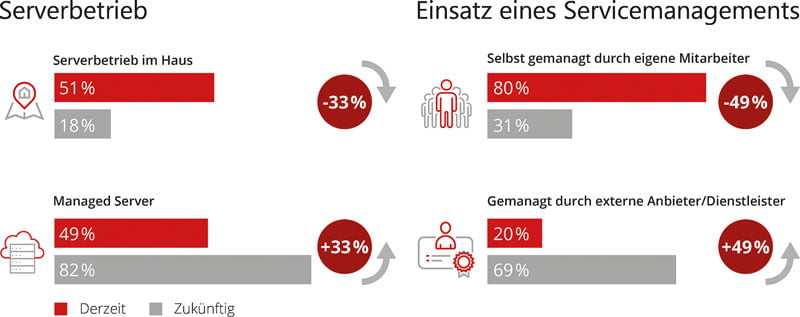

Managed servers are offered and operated by managed service providers (MSPs) with their own data centers, so that companies no longer have to worry about the maintenance and security of their servers themselves. Even though every second company still uses its own servers, the trend towards managed servers is clear, as a recently published study by the analyst firm Techconsult shows: 82 percent of the IT experts surveyed plan to use managed servers in the future, even if there are reservations, particularly in the case of mature, complex IT environments. The trend toward a managed server operated by external IT professionals is nevertheless not surprising, since only one in ten companies has no problems with the local company servers. Server failures are the main problem here (36 percent).
However, many companies also report rising or excessive costs (32 percent) for energy and maintenance. In addition, slow server response times are a concern for companies (30 percent), meaning that interruptions to working hours and high load times are commonplace. The reason why companies have not yet switched to managed servers is, in their opinion, due to the excessive effort required for migration (39 percent), the costs (38 percent) or the IT infrastructure, which in their own opinion would not allow migration. This is strongly linked to the assumption that outsourcing the company's overly complex IT architectures is no longer possible.

However, it becomes apparent that these initial assessments should not necessarily be viewed in isolation, because a migration process does involve a lot of effort, but it is unique and creates a modern platform for the company on which the data, structures and configurations can be found again. In contrast, companies that already use managed servers report a reduction in the burden on their own IT. This is stated by 44 percent of the companies. The reason for this is the service management often associated with it, in which the providers host, maintain and update the servers themselves. The company's own IT department is relieved and can take care of other business processes. Thirty-six percent of companies also associate this with an opportunity for cost savings in terms of server operation and maintenance, with a simultaneous improvement in security.
Compared to in-house operation, the holistic cost analysis of most IT experts shows that annual savings of between 10 and 19 percent can be achieved. Germany as a location is also becoming increasingly important for managed server providers in order to be prepared for the requirements of data protection and data security. The European General Data Protection Regulation (GDPR) in particular has led to an upswing among local service providers, which will also continue in the managed server sector, according to the Techconsult study.






